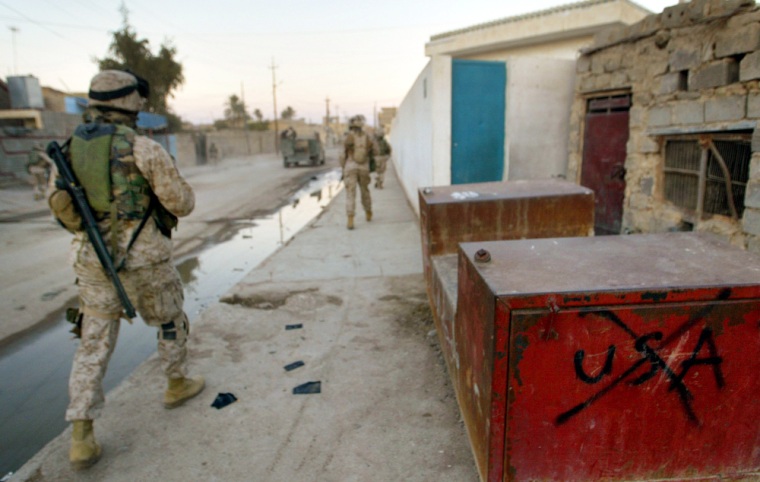In April 2003, as the U.S.-led invasion of Iraq was ending, the Pentagon projected in a formal planning effort that the U.S. military occupation of the country would end this month.
Instead, December 2004 brought the deadliest single incident of the war for U.S. forces, with more than 80 casualties suffered yesterday by U.S. troops, civilian contractors and Iraqi soldiers when a U.S. base near the northern Iraqi city of Mosul was blasted at lunchtime.
At least 19 of those killed in the attack on a mess tent at the city's airport were American soldiers -- more U.S. troops than have been lost in any other major incident in the fighting, even during the spring 2003 invasion. Before yesterday, the worst incidents were the deaths of 17 soldiers from the 101st Airborne Division in the November 2003 collision of two UH-60 Black Hawk helicopters, also in Mosul, and, two weeks before that, the loss of 15 soldiers when a CH-47 Chinook transport helicopter crashed west of Baghdad. All three occurred after President Bush's May 2003 declaration that major combat operations in Iraq had ended.
The major difference between the latest attack and the earlier incidents is that it was an attack on a U.S. base, rather than on troops in transit in vulnerable aircraft. That difference appears to reflect both the persistence of the insurgency and its growing sophistication, as experts noted that it seemed to be based on precise intelligence. Most disturbingly, some officers who have served in Iraq worried that the Mosul attack could mark the beginning of a period of even more intense violence preceding the Iraqi elections scheduled for Jan. 30.
"On the strategic level, we were expecting an horrendous month leading up to the Iraqi elections, and that has begun," retired Army Col. Michael E. Hess said.
Jeffrey White, a former Defense Intelligence Agency analyst of Middle Eastern military affairs, said he is especially worried that the insurgents' next move will be an actual penetration by fighters into a base. "The real danger here is that they will mount a sophisticated effort to penetrate or assault one of our camps or bases with a ground element," he said.
If anti-American violence does hit a new level, pressure is likely to increase on the Bush administration to either boost the U.S. military presence in Iraq or find a fast way to get out.
The adequacy of current troop numbers is one of the questions provoked by yesterday's action, said Charles McComas, a veteran Special Forces soldier who served in Afghanistan before retiring. "Do we have the right forces and enough of them to do the offensive patrolling to reduce the chances of this happening again?" he asked.
A private-sector security expert who recently left Baghdad after more than a year there agreed, noting that the United States originally put an entire division in the Mosul area, the 101st Airborne, but replaced it earlier this year with a force about half that size, only to see insurgent attacks increase. "We have replaced a division with a brigade and think we can offer the same amount of security," he said, insisting on anonymity because his opinions are so at odds with the official U.S. government view.
'Tame the tribal warfare'
The attack also indicates that the insurgency is growing more sophisticated with the passage of time. One of the basic principles of waging a counterinsurgency is that it requires patience. "Twenty-one months" -- the length of the occupation so far -- "is not a long time to tame the tribal warfare expected there," said retired Marine Lt. Col. Rick Raftery, an intelligence specialist who operated in northern Iraq in 1991. "My guess is that this will take 10 years."
Another principle, less noted but painfully clear yesterday, is that insurgents also tend to sharpen their tactics as time goes by. Over the past 20 months, enemy fighters have learned a lot about how the U.S. military operates and where its vulnerabilities lie.
"The longer you are anywhere, the more difficult it becomes," said Hess, who served in northern Iraq in 1991 and in Bosnia in 1996. "They have changed their tactics a lot in the year-plus."
Several experts noted that insurgents appear to have acted on accurate intelligence. Kalev Sepp, a former Special Forces counterinsurgency expert who recently returned from Iraq, noted that the attack "was carried out in daylight against the largest facility on the base, at exactly the time when the largest number of soldiers would be present."
"This combination of evidence indicates a good probability that the attack was well-planned and professionally executed," Sepp said.
Infiltration?
A byproduct of such a strike is that it tends to drive a wedge between U.S. personnel and the Iraqis who work on the base. "I think that this tells us first that our base facilities are totally infiltrated by insiders who are passing the word on when and where we are most vulnerable to attack," said retired Marine Col. Edward Badolato, a security expert.
Not all experts were pessimistic. Retired Army Col. John Antal said he expects more spectacular attacks in the coming weeks, but mainly because "the enemy is on the ropes and desperate to stop the elections."
But others were throwing up their hands. "This sure isn't playing out like I thought it would," said retired Marine Lt. Col. Jay Stout, author of a book about the 1991 Persian Gulf War against Iraq, in which he fought. He said he is no longer confident about what the U.S. strategy in Iraq should be.
"We have few choices: We can maintain the status quo while trying to build an Iraqi government that will survive, we can get the hell out now and leave them to kill themselves, or we can adopt a more brutal and repressive stance."
His choice? "I don't know the right answer -- I gave up guessing a few months ago."
